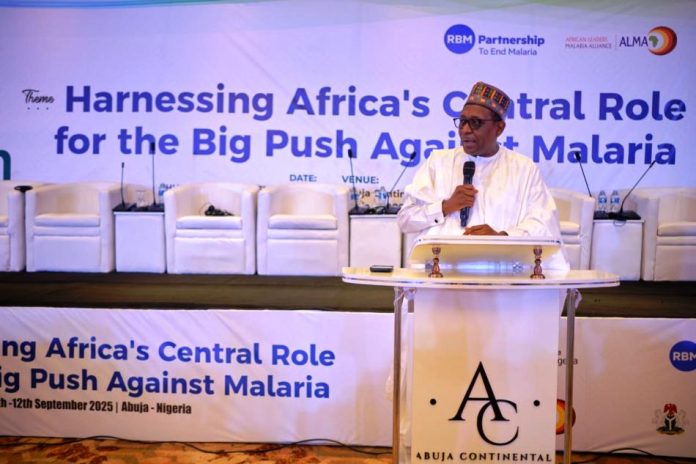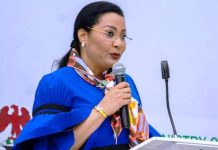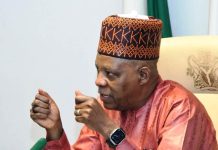
ABUJA, Nigeria – The Federal Government has called on African leaders and stakeholders to take full ownership of the fight against malaria, warning that over-reliance on external financing and fragmented interventions will continue to stall progress against the disease that kills nearly 600,000 people globally each year.
Delivering a keynote address at the Harnessing Africa’s Central Role Against Malaria – Big Push meeting in Abuja, the Coordinating Minister of Health and Social Welfare, Professor Muhammad Ali Pate CON, said Africa must reframe malaria as an African problem and mobilise domestic resources to confront it.
“Malaria is not someone else’s problem; it is our problem. Ninety percent of the global burden is here in Africa. Unless we own it, fund it, and act decisively, we will be back here next year and the year after, repeating the same conversations,” Pate told delegates drawn from governments, civil society, development agencies, and the private sector.
He lamented that despite Nigeria running a malaria control programme for nearly 80 years, the country still bears one-third of the global malaria burden. He attributed this to a historic pattern of outsourcing solutions to external partners, leaving domestic investments in prevention, diagnosis, and treatment far behind.
“Over the last 25 years, as external financing went up, domestic financing went down. We cannot continue outsourcing our problem to Geneva or Washington. We must design strategies that reflect our realities in Sokoto, Bayelsa, Lagos, and elsewhere in Nigeria,” Pate stressed.
Local Production and Integration of Services:
The minister outlined steps Nigeria is taking to localise malaria control efforts. These include:
The establishment of diagnostic kit manufacturing plants with capacity to produce hundreds of millions of test kits annually.
Ongoing plans for the world’s largest mosquito bed net manufacturer to set up operations in Nigeria after two decades of importing over 600 million nets.
Integration of malaria case management into primary healthcare services to reduce hospital visits and complications.
Local pharmaceutical companies are now supplying artemisinin-based therapies under Global Fund procurement.
“These are not just health interventions but also economic opportunities to create jobs and retain value within our economy,” he said.
Calling for Sustainable Financing, Professor Pate pointed to ongoing reforms to expand Nigeria’s fiscal space, including new tax measures that could channel resources to health. He argued that malaria should not be treated as a stand-alone issue but addressed within the broader context of strengthening health systems.
“Nearly one-third of visits to our hospitals are due to malaria or its complications. To truly fight malaria, we must strengthen the entire health system – financing, workforce, and service delivery,” the coordinating minister noted.
Underscoring the urgency, the Honourable Minister of State for Health & Social Welfare, Dr. Iziaq Adekunle Salako, described malaria as both “preventable and treatable” yet still a leading cause of illness and death in Africa.
Citing World Health Organization (WHO) data, he said an estimated 263 million malaria cases and 597,000 deaths were recorded globally in 2023, with Africa accounting for 94 percent of cases and 95 percent of deaths.
“These figures are unacceptable. To defeat malaria, we must mount a big push. This means reaching at-risk populations with preventive tools, ensuring access to affordable diagnosis and treatment, and innovating to overcome new challenges such as insecticide resistance and climate change,” Salako said.
He warned that humanitarian crises, including conflicts and natural disasters, are exacerbating the spread of malaria by leaving displaced populations without healthcare. Climate-related floods and droughts, he added, are also creating new breeding grounds for mosquitoes, making malaria control even more complex.
Both ministers stressed that defeating malaria will require multi-stakeholder collaboration across governments, NGOs, the private sector, and communities. They called for investment in research and development, scale-up of vaccines, environmental control measures, and robust civil society engagement.
“Countries that have eliminated malaria had to persevere, innovate, and invest consistently. Nigeria and Africa must do the same. With leadership, collaboration, and ownership, a malaria-free future is possible,” Dr. Salako said.
The Federal Government emphasised that while global partners such as the Global Fund, the U.S. President’s Malaria Initiative, and the Gates Foundation remain vital allies, Africa must transition from dependency to ownership.
“We deeply appreciate our partners, but ultimately, this is our fight. Malaria is an African problem. It will only end when we treat it as such and put our own skin in the game,” Prof. Pate added.
The Abuja meeting, hosted by the Federal Government in partnership with the Roll Back Malaria Partnership (RBM), the African Leaders Malaria Alliance (ALMA), and supported by the UK Foreign, Commonwealth and Development Office (FCDO) will strengthen political commitment and align continental strategies toward malaria elimination by 2030.
The two-day conference is expected to produce a continental roadmap to accelerate malaria elimination efforts, mobilise domestic financing, and strengthen Africa’s central role in global malaria eradication strategies.
Signed
Alaba Balogun
Head, Information & Public Relations
14 September 2025





